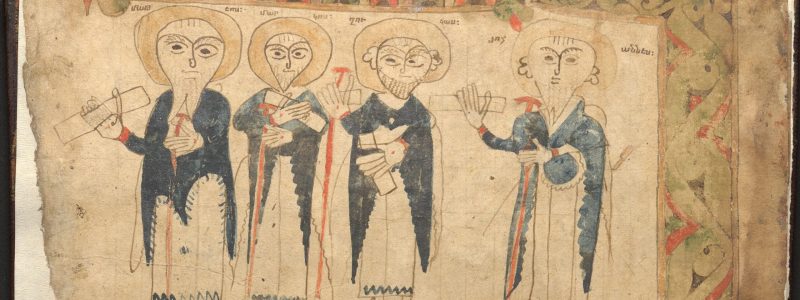Startpage » Usage + Visit » Subject Specific Services » Subject Information » Christian Orient
Overview
Contact
This link leads to a list of all the subjects this person oversees.
Here you find the contact information of the above-mentioned person.
Library Holdings and Acquisitions
Including the holdings of the Seminar for Christian Orient and Byzantium, the DMG library as well as the acquisitions of the SSG and the FID, the University and State Library was able to compile one of the largest and most extensive collections on the so-called Oriens Christianus. In addition to the library of the founder of the seminar, Alexander Böhlig, the ULB was also able to acquire the extensive literary collection of Julius Assfalg (Munich) in 2001, whose holdings focus on Coptology, the Syriac Churches, the Georgian Orthodox Church and Armenology. The latter theme is supported, acquisition-wise, by the profile of the MESROP Centre for Armenian Studies located at the Seminary. The holdings of the library primarily focus on theology and religious studies, but also on linguistics and literary studies as well as the history of Oriens Christianus.
In addition to printed works, the ULB also offers access to numerous electronic sources via open access, especially digitised classics relating to the subject.
Gaps in the holdings of Western secondary literature, stemming from the period between 1945 and 1990, are consistently being filled should they prove to be of particular importance for current teaching and research. The current collection foci are aligned with the prevailing profile of university teaching and also include recently published Western secondary literature. Teaching and introductory works are available in German or English. The FID, on the other hand, mainly acquires literature written in the languages of the MENA region. The subject-specific area of Byzantine Studies is no longer covered in its entire range within the spectrum of the collection.
Finding and Using
Titles related to the Oriens Christianus are mainly located in stacks at the Branch Library Middle East/Ethnology and therefore have to be ordered via Ha:lit. When researching titles in non-Latin scripts, please be aware of the transcription regulations applied in the German library system. The lending of requested media is taking place at the circulation desk of the Branch Library Steintor-Campus. Apart from a few exceptions, the holdings can be borrowed freely. Additionally, there is an area containing general reference works and dictionaries shelved in the reading room of the Branch Library Middle East / Ethnology.
Website of the FID Middle East, North Africa and Islamic Studies
The subject portal Menalib provides an overview of the various services offered by the FID as well as research access points for printed and electronically available works on Arabic, Middle Eastern and Islamic Studies acquired by the FID.
Consultation and Training Services
Library introductions, training courses for literature research and literature management systems as well as consultations on publication strategies and research data management take place at regular intervals.
Collection of Subject-Relevant Links
Due to the large number of smaller sub-disciplines, the electronically available journals of the subject are difficult to collectively access in the Elektronische Zeitschriftenbibliotek (EZB). Only for Byzantine Studies does the EZB actually provide a number of titles.
For researching literature on the Oriens Christianus, there is a small number of specialised databases available in the Database Information System (DBIS) of the ULB. In this regard, the Patrologia Orientalis Database is especially noteworthy. You can access the databases and trials negotiated by the FID via Menalib.
Please remember to activate the VPN connection when researching outside of reach of the university wifi.
History and Profiling of the Subject
The study of oriental languages at the MLU dates back to its founding phase, though it is noteworthy, that Semitic languages, such as Hebrew, were predominantly taught for supporting Bible exegesis in theology until the 19th century. At the centre of what was then known as Oriental Studies stood the effort to access early Christian texts having not been preserved at all or only in fragments in the Western hemisphere through the study of the languages of the Oriental Christian churches. This concerned Semitic languages (Hebrew, Syriac, Arabic, Ge’ez, Amharic), Coptic, Nubian, Armenian and Georgian, all of which were interconnected, but also connected to Greek by a lively tradition of translating religious texts. Thanks to the establishment of the library of the German Orientalist Society (DMG) in Halle, the stock of relevant literature on the Christian Orient, both translated and written in the original languages, grew considerably towards the end of the 19th century, which continued up to the present day.
Institutionally, the subject of Christian Orient Studies, which today is offered at only two other locations in Germany, was first established at the MLU by the name of “Seminar for Byzantine Studies” in the early 1960s. Originally part of the Department of Theology, it is now part of the Oriental Institute via the Faculty of Philosophy going by the name of “Christian Orient and Byzantium”. Since 1998, the seminar has benefited from the extensive acquisitions and services offered by the Special Subject Collection (SSG) Middle East incl. North Africa (1998-2015) as well as the Specialised Information Service (FID) Middle East, North Africa and Islamic Studies (since 2016), both being maintained by the ULB.
At the Seminar of Christian Orient and Byzantium in Halle, both the Bachelor of Arts (BA) and the Master of Arts (MA) can be obtained.


